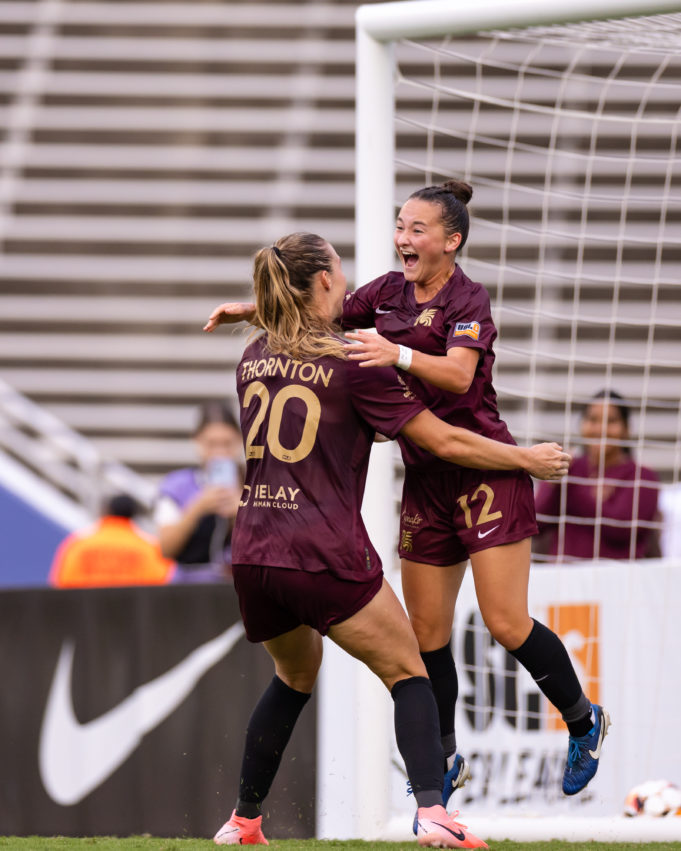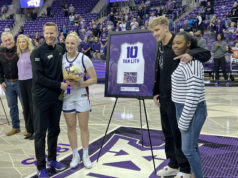On Saturday, I, like many Americans, went to a football game.
I watched it in a historic stadium, where the likes of Lee Roy Selmon, Bob Lilly, Earl Campbell, and Doak Walker once dug their cleats into the grass.
It was a great game even though I didn’t see a single touchdown.
“We’re absolutely delighted every time that we’re here at the Cotton Bowl. The crowd has been incredible, and we want to put on an entertaining match,” said the coach of the home team afterward.
She then went on to say, “We want to play good soccer, and we want them to keep coming back and grow as well.”
So yeah, the code of football I watched in Dallas was not the American one. It was the association football code, what we in the U.S. call “soccer.” The coach, Pauline MacDonald, led her Dallas Trinity FC club to a 1-0 win over Fort Lauderdale United to take sole possession of third place in the USL Super League standings.
A little more than 3,000 fans made the same choice I did. DTFC forward Allie Thornton was glad they decided to support the first-year team.
“We have the mascot there yelling the chants and beating the drum, she said. “The atmosphere is so nice. And I think as players on the field, we tend to build off that energy.”
The experience got me thinking about the way I choose which sporting events I watch (and I watch a lot of them). Certainly professional considerations influence it. I work with a lot of teams and sports, so I’m definitely more likely to watch a game that helps me prepare for a production project. In this case, I’ve got a women’s soccer docuseries set to be announced as soon as this week, so I’ve been dialed into that sport.
One thing I realized doesn’t factor much into my decision-making is the gender of the participants. Women’s and men’s sports both offer all the things I like about sports.
I actually went to a men’s college football (gridiron variety) game last Saturday. I saw a lot of touchdowns in that one as my alma mater, Trinity University, defeated Berry College on a Tyler Huettel overtime field goal. The win kept the Tigers’ conference title hopes alive. The DTFC match I attended featured a late goal by an academy player just back from international duty and the result came against a Fort Lauderdale squad with whom the home team was tied in the standings.
Both contests had great storylines, compelling displays of athleticism, and meaningful results – all common sports attributes that have nothing to do with whether women or men are the ones wearing the uniforms.
I feel like gender-neutral sports viewership is becoming more common. The popularity of women’s sports is up across the board. Some of it has to do with increased availability. I addition to increased grassroots participation, there’s more TV coverage and more teams around to follow.
“Being able to be in a stadium like this is incredible, especially it being the first year in the inaugural season,” said Dallas Trinity FC goalkeeper Madison White. “It’s a great feeling. And I think it’s also very important, because we’re representing our city.”
The idea that a women’s pro soccer team should be entitled to represent a municipality in a historic stadium has gone mainstream.
“It’s a lot just when you first walk out and you just see the lights and just the stands around you. Honestly, it feels a little overwhelming at the start,” said Sealey Strawn, who scored the game-winning goal for DTFC in the 87th minute. “But as soon as you get on the field, everything just kind of disappears around you. You hear the crowd, you hear the cheering, but it just disappears and you’re playing the game and the style that you were told to play.”
Strawn’s tally was her first as a professional. She had turned 17 years old a month earlier. She may have the good fortune to play an entire career in a world where it’s not unusual for her to play in a big stadium in front of fans who decided to watch her games based on the important things.











